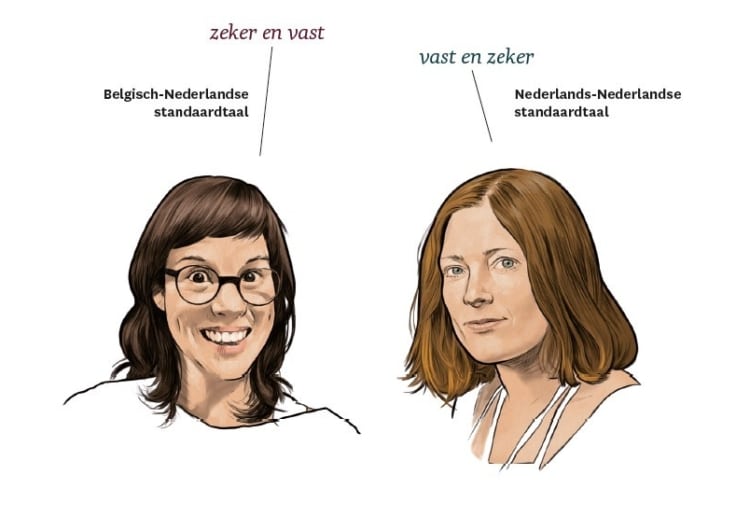Unnecessary Words Don’t Exist
Irksome English, the essay published on this website in which cultural philosopher Ton Lemaire was bothered by the adoption of English words into Dutch, inspired linguist Marten van der Meulen to respond. “Synonyms, as well as English words, only make our language richer and give us more possibilities of expression.”
Oh, to be a dentist – how delightfully easy that would be. While pretty much everyone has teeth, hardly anyone has an opinion on how to perform a root canal. Or a geologist! Pastoral simplicity! We all walk this earth with our own two feet, but few form opinions about sedimentary layers. How about those pilots? Easy breezy. They’ve flown billions of passengers through the air, but no one tells a pilot how to pilot.
But no, consider the linguist. What a crap job. Like teeth, earth, and aeroplanes, everybody deals with the ins and outs of their expertise on a daily basis – namely language. But where the dentist, geologist and pilot are respected for their expertise, the linguist is scorned, mistrusted, or plainly ignored. Without ever paying attention to what the professionals have to say on the subject, just about everybody has his/her/their own opinion about language at the ready. Personal experience appears to suffice. An unusual foundation: I have a lot of experience with breathing, but that doesn’t mean I understand the inner workings of the lungs.
When it comes to the influence of the English language, one hears wailing and wallowing from every side
Amidst all the linguistic lamentation, no subject is more susceptible to public scrutiny than the alleged Anglicization of Dutch. When it comes to the influence of the English language, one hears wailing and wallowing from every side. Nope, the Dutch language is nowhere to be found in Amsterdam (nonsense)! Our language is being inundated (it’s not)! We’ll all be bilingual within a generation (again, no)! Allegations aplenty, but facts are lacking.
Take the sneak preview that recently appeared on this site of a new book by cultural philosopher Ton Lemaire. Lemaire laments the fact that an Anglo-Saxon monoculture is emerging. It is a recognizable concern and, in my view, a justified problem. But I wouldn’t know: because I’m a linguist. And while language and culture are closely related, they are by no means the same thing.
Lemaire argues in earnest against all aspects of the alleged influence of the English language on Dutch. And he gets just about everything wrong
Apparently, Lemaire is not up on this distinction, because he makes language a central part of his cultural critique. He argues in earnest against all aspects of the alleged influence of the English language on Dutch. And he gets just about everything wrong, too much to be able to tackle point by point. But it all comes down to one thing: he is annoyed by “the adoption of an English word when there is a perfectly good synonym available in one’s own language.” There are two important problems with that statement.
First of all, our language is full of synonyms, one of which will have been loaned from another language. Tevreden and content. Mooi and fraai. Briefkaart and ansichtkaart. Dame and koningin (in chess). Voorwoord and proloog. Direct, onmiddellijk, and linea recta. Hoe dan ook, sowieso, and überhaupt. Ongemakkelijk and genant. Zetel and fauteuil. I could go on and on. Why should all of those synonyms be acceptable, but the English ones an abomination? What kind of selective indignation is that?
Well, says Lemaire, the problem is that there are a lot more words now than there used to be. Even if that is the case, we also have to look at the fact that there are still many more words in French, German and Latin in our language that are also used much more often, and that many English words are simply vagrants. As quickly as they come, so quickly, too, do they go. A little perspective can be very instructive.
Any linguist can explain to you that true synonyms are rare. There are almost always at least minute differences
Most importantly: what makes a word unnecessary? Any linguist can explain to you that true synonyms are rare. There are almost always at least minute differences. For example, the context in which a word is used. English gives us a nice example of the difference between ‘strong’ and ‘powerful’. They seem synonymous in meaning, but if we look at the context, we see that ‘strong’ is primarily used in conjunction with communication words like ‘statement’ and ‘message’. ‘Powerful’ on the other hand tends to be used with emotive words like ‘sense’ and ‘feeling’.
Differences also exist between the registers in which words are used. Indien and als
mean the same thing – ‘if’ – but one is formal, the other ‘normal’. Or take the social context of language. Hoe gaat het? may mean the same in content as fawaka or waddup, but it is not used by the same people or in the same situations. To say that a word is unnecessary just because a corresponding word already exists shows a poor understanding of language and the world. Language (and culture, I reckon) is about more than just content. Synonyms, as well as English words, only make our language richer and give us more possibilities of expression.
Lemaire confuses two important things: language choice and word choice
Finally, Lemaire confuses two important things: language choice and word choice. Language choice is about which language you choose for an entire conversation, whereas word choice is, as the name implies, about the choice of specific words. Business and education in English? Sure, that might be a legitimate cause for worry. Fortunately, this happens relatively little outside of education. Words? We hardly need to worry about that. Words are the paint of language. They are important to the picture, but superficial. Grammar is the foundation of our language. And that foundation holds strong.
Like Lemaire, I have also written this article out of annoyance. Most people don’t have a clue how language works, and they don’t even bother to learn more about it. There are so many good books about language out there. When it comes to the Dutch language, I like the chapter by Flemish linguists Eline Zenner and Laura Rosseel in Wat gebeurt er in het Nederlands?! Or the open access loan word dictionary by Nicoline van der Sijs. Or, if you don’t feel like reading about it, just think about the dentist. Open your mouth, close your eyes, and trust that someone else knows what they are doing. Just leave the linguistic root canal to the language dentist. The amateur dentist aggravates the pain.








